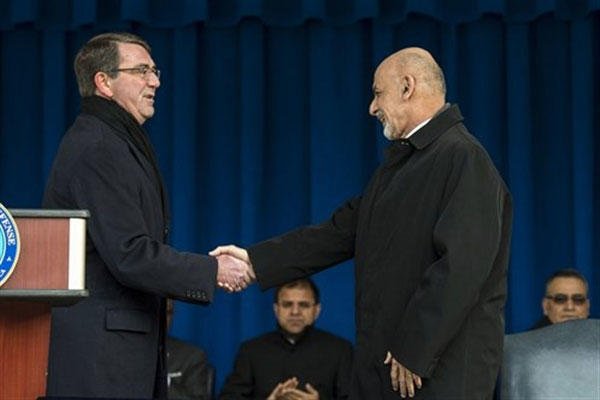Afghan President Ashraf Ghani paid tribute Monday to the sacrifices of U.S. troops ahead of talks with President Obama on the pace of the final withdrawal from America's longest war.
In remarks in the Pentagon's courtyard, Ghani thanked service members who fought in Afghanistan and pledged that in the future "We are going to put our house in order."
"We are not going to be a burden to you," Ghani said. "Don't ask what you can do for us. We want to do it ourselves."
Ghani, a former World Bank official partly educated in the U.S., also thanked American taxpayers who "made your hard-earned dollars available to Afghanistan." With the help of Afghan chief executive Abdullah Abdullah, "we commit to accounting for every penny," Ghani said.
Congress has appropriated more than $60 billion to train, equip, and sustain the Afghan forces, and the Defense Department has asked for an additional $3.8 billion in 2016.
The appearance at the Pentagon with Defense Secretary Ashton Carter and Secretary of State John Kerry kicked off a week of discussions that will focus mostly on possible changes to President Obama's current plan to withdraw the estimated 10,600 U.S. troops now in Afghanistan by January 2017.
The plan would end the current training, advisory and counter-terror role for U.S. troops and leave behind about 1,000 Kabul-based troops for Embassy security duties.
Ghani has echoed U.S. Army Gen. John Campbell, the U.S. commander in Afghanistan, in urging "flexibility" in the plan that now calls for cutting the number of U.S. troops in Afghanistan to 5,500 by the end of this year.
Campbell and Kerry have praised what they sense is a new spirit of cooperation and accountability from Ghani and Abdullah in contrast to the testy relationship the U.S. military leaders had with former Afghan President Hamid Karzai at the end of his time in office.
Karzai refused to sign a Bilateral Security Agreement with the U.S. for the continued presence of U.S. troops.
In what was billed as his farewell speech last September, Karzai said "I tell you again that the war in Afghanistan is not our war, but imposed on us and we are the victims. No peace will arrive unless the U.S. or Pakistan want it."
The White House has suggested a willingness to go along with "flexibility' while sticking to the end date of January 2017. Last month, Rep. Mac Thornberry, chairman of the House Armed Services Committee, told reporters that Ghani has suggested to him and others that all 10,600 U.S. troops should stay in Afghanistan through the end of this year.
In a conference call with reporters last Friday, Jeff Eggers, a senior Obama adviser on Afghanistan and Pakistan, said that "As a strategic matter, it remains the intent to continue the retrograde" of U.S. forces from Afghanistan.
However, Eggers also stressed that "no decisions have been made" on possible changes to the plan. Pentagon officials suggested that a decision might come following Ghani's meeting with Obama at the White House on Tuesday.
Sen. John McCain, chairman of the Senate Armed Services Committee, and others in Congress have warned that a rapid withdrawal from Afghanistan would erase hard-won progress and risk a return of the Taliban.
At a committee hearing last month, McCain said a speedy drawdown would "allow terrorists to foment the same disaster in Afghanistan as we have seen in Iraq -- growing instability, terrorist safe havens and direct threats to the United States."
From the Pentagon, Ghani went with Carter to the presidential retreat at Camp David, Md., for talks with Gen. Campbell and others on the way forward as Afghanistan faces another "fighting season" this summer against the Taliban and the remnants of Al Qaeda. Ghani was meeting later Monday with U.S. Treasury Secretary Jack Lew on continuing financial support from the U.S. and allies.
Ghani had White House meetings scheduled for Tuesday and will address Congress on Wednesday before heading to New York for meetings at the United Nations on Thursday, White House officials said.
At the Pentagon ceremony before an audience of about 300, Ghani followed up on the remarks of Carter, who singled out the presence of the families of Navy Lt. Cmdr. Lonn Larson, Army Capt. Jeremy Haynes, and Army Maj. Gen. Harold Greene, who was the highest-ranking U.S. officer to be killed in Afghanistan.
Ghani told Greene's widow, retired Army Col. Susan Myers, that "I saw determination, I saw hope, I saw honor from the legacy of the general." He said a section of the military academy where Greene was killed in an "insider attack" by an Afghan soldier would be named for the Greene.
Carter said that Capt. Haynes, who was severely wounded in the attack on Greene, was now recovering and preparing to take the Army fitness test. Doctors initially told him he would be paralyzed from the waist down.
Ghani said that Haynes showed "that determination, that grit, that desire to move on that characterizes your profession."
Ghani spoke directly to Reese Larson and later hugged the nine-year-old daughter of Larson, who is now serving in Afghanistan.
Ghani told Reese Larson that because of the U.S. presence 3 million Afghan girls were now attending school "when 14 years ago there were exactly none. Do thank your Dad and remember he is there making a difference."
-- Richard Sisk can be reached at richard.sisk@military.com



























